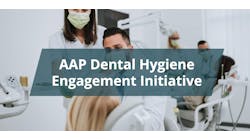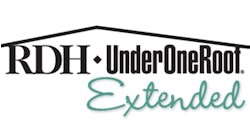Dear Dianne,
I have worked in the dental profession for eleven years now, first as an expanded functions dental assistant (EFDA) and now as an RDH.There are very few jobs available in my area. In fact, some of the women I graduated with three years ago are still looking.
Recently I accepted a full-time position in a general practice setting with a "less-than-attractive" dental hygiene department. Scheduling is set on a thirty-minute schedule, and when the dental assistants are available, they sometimes help take radiographs and tear down rooms. Often I feel I am shortchanging my patients. I feel ashamed that I have accepted a position like this, because I promised myself I would never do assembly-line hygiene! But as a provider for my family, at this point I have no other options.
I have made suggestions about adjusting the schedule, but my suggestions have been blown off. In fact, the office manager (the dentist's wife) said, "It's okay if you run behind. We will just contact the next patient and move that person down." Totally not my point! She told me that I should never look at the clock and always use as much time as I need. However, this does not seem like ideal practice management to me. When I make notations that I need forty-five minutes for the next visit, my requests are ignored. HELP!
As an intelligent and skilled professional, I am shorting my patients from receiving optimal care and putting myself at risk by skirting established standards of care. My question is this: what facts and information can I gather and provide to the husband and wife team to encourage at least forty-minute prophylaxis appointments with the help of a full-time assistant?Overworked and discouraged
Dear Overworked,
Your letter touched my heart, and I ache for you! You are working in a "prophy mill" that is not unlike the notorious "puppy mills" where the mantra is quantity over quality. Puppy mills breed their dogs to death just to turn out more puppies to sell. By overbreeding, they injure their dogs, some to the point of death. By overscheduling, hygienists are made to feel the work they do is not important. Many are injured from repetitive motion injuries associated with overscheduling.Some good clinicians leave the profession as they burn out from the stress of daily overscheduling.The suggestion to ignore the clock shows a blatant disrespect for the patient's time and your own sanity!
Is the practice heavily into HMO/PPO dentistry? If it is, the practice cannot charge out the full fee, so often appointments are shortened to allow for more volume, which theoretically makes up for the shortfall in fees. I'm not making excuses here, just explaining the economics of the issue. However, insurance participation or not, there is no excuse for substandard care of our patients. My first question is, does the wife overbook her husband, the dentist? What would happen if she did? Obviously, she couldn't get away with that. How would the doctor like it if he knew he had to cut corners out of necessity? How would he like it if he told the scheduler he needed forty-five minutes for a procedure and was given only thirty minutes? What if this overscheduling scenario happened every day, not just once in awhile? Most likely, there would be hell to pay!
My next question is this: Are there two hygiene rooms available? If so, you could do assisted hygiene with a dedicated assistant, see twelve to fourteen patients in an eight-to-five day, and be less tired at day's end than if you saw nine patients in a solo model. I worked an assisted model and much preferred it over solo hygiene. I found the assisted model to be much more relaxed for me since I did not have to attend to cleanup, setup, sterilization, dismissal of the patient or scheduling of the next appointment. A big plus was having the benefit of someone to help me with chartings and chairside assistance if I needed an extra set of hands. You would be amazed how expeditiously you can complete periodontal scaling if you have someone to suction for you while power scaling.
If assisted hygiene is not an option because of insufficient number of available treatment rooms, then you have some choices:
• Consider moving. Some areas of the country have become saturated with hygienists to the point where jobs are scarce. Apparently, there are more doctors retiring than new graduates to take over their practices. Additionally, over the past fifteen years, new hygiene programs have sprung up all over the country, the result being oversaturation of the job market. However, there are areas where the hygiene market is not saturated. If moving is an option, be sure to contact the state dental hygiene association to get information about job availability.
• Put your thoughts down on paper and approach the doctor and office manager with the problem and a viable solution, part of which is to schedule your own patients for their successive appointments. Appeal to their sense of fairness and professional pride. "If you went to a doctor for an outpatient procedure, the doctor indicated he needed one hour, but his scheduler only gave him forty-five minutes, what part of your procedure would you want him to cut corners on? That's the predicament I'm in. I can't possibly do what I know I should be doing in the small time I'm given. I feel like I'm cheating the patients, and the guilt is killing me. I really need your help on this. I don't think our patients are stupid, and they cannot possibly perceive high-quality care the way they are rushed in and out. These are your patients. I want to take good care of them, but that takes time."
The office administrator has never walked in your shoes, so she has no way of understanding your dilemma unless you use an analogy she can understand. The right communication could turn this situation around for you, and for the sake of the patients and you, I hope it does. The standards of care of dentistry and dental hygiene that are set forth by licensing boards are not to be ignored in the pursuit of higher profits. To do so is to put our patients and licenses at risk.
The sad fact is, you are not alone in this overscheduling dilemma. Schedule abuse and low-quality care exist when the leader is more interested in quantity over quality. I maintain that patients are not stupid. If they do not receive high-quality care, they will not place high value on the preventive care they are given. And if they do not perceive high value, they are not likely to continue that care if they have to pay out-of-pocket, which is a growing problem for more and more people as they lose their jobs and dental benefits. What goes around comes around.
Best wishes,
Dianne
About the Author
Dianne Glasscoe-Watterson, RDH, BS, is a professional speaker, writer, and consultant to dental practices across the United States. She is CEO of Professional Dental Management, based in Frederick, Md. To contact Glasscoe-Watterson for speaking or consulting, call (301) 874-5240 or e-mail [email protected]. Visit her Web site at www.professionaldentalmgmt.com.





